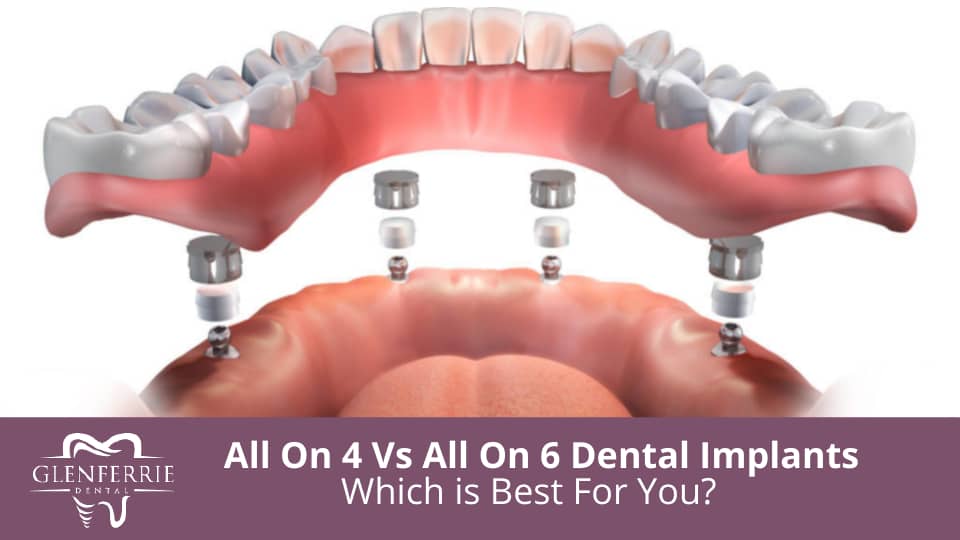Missing teeth is a challenge a lot of people face. Due to various advancements, treatments such as All on 4 and All on 6 allow for an immediate transformation with minimal downtime needed.
Each All on X procedure has its own benefits and drawbacks.
All on 4 dental implants, as the name implies, involve the strategic positioning of four dental implants in your lower or upper jaw, whereas All on 6 implants is the placement of six dental implants.
They both function as firm support for your dental implant teeth, so which one is better for you? Let’s dive in.
What Are All-on-4 Dental Implants?
All on 4 dental implants is a treatment process where four dental implants are placed into either the upper or lower jaws and an implant-supported bridge is fitted onto the dental implants.
The All on 4 journey will start with a consultation where your dentist will examine your dental and medical history. They will require various additional investigations such as OPG x-rays and cone beam CT scans to determine the best treatment plan suited to your needs.
Your dentist will find the strongest and most suitable positions in your jawbone and place the four dental implants in the strategic positions. In most cases, two dental implants are placed in the front of your jawbone and two in the back. This is followed by an abutment that connects the artificial teeth to the dental implants.
How Does All On 4 Implants Work?
All On 4 implants work by using just four implant posts to support a full arch of replacement teeth. The implant posts are surgically placed into the jawbone, and they act as a foundation for the replacement teeth. Once the implants have healed and fused with the jawbone, abutments are placed on top of the implants. The replacement teeth are then attached to the abutments, completing the process. All On 4 implants offer a long-lasting solution for missing or damaged teeth, and they can last for many years with proper care.
All on 4 Benefits/Advantages
- Less bone mass is needed in the patient\’s jaw, as only four implants are placed.
- Less likely you will require bone grafting or a sinus lift. Again, fewer implants means the procedure will work for more patients, as the dentist can place the implants where you already have good bone mass.
- Lower cost, when compared to All on 6, as 50% more implants, are used in the All on 6 procedure.
What Are All on 6 Dental Implants?
All on 6 dental implants are quite similar to their All on 4 implant counterparts. The All on 6 implants involve strategically placing six implants into your jawbone to serve as a base for your dental implant bridge.
The dental implant journey will also start with a thorough and comprehensive examination. Here your dentist will check for the health and structure of your jawbones. If need be, you may be scheduled for a bone graft procedure in anticipation of the dental implant placement.
Similar to the All on 4 procedure, the All on 6 procedure is designed for immediacy. That is, within a short time frame (typically within 24 hours) after the dental implants are placed, the dental implant bridge will be fitted to return your confident and vibrant smile.
How Does All On 6 Implants Work?
All On 6 implants work by using six implant posts to support a full arch of replacement teeth. The implant posts are surgically placed into the jawbone, and they act as a foundation for the replacement teeth. Once the implants have healed and fused with the jawbone, abutments are placed on top of the implants. The replacement teeth are then attached to the abutments, completing the process. All On 6 implants offer a long-lasting solution for missing or damaged teeth, and they can last for many years with proper care.
All on 6 Benefits/Advantages
- More stability through two more implants that the dental prosthesis rests on.
- More evenly distributed bite force.
- Better for people who have a full set of natural teeth that they want to keep because grinding or biting with your strong natural teeth on the All on 4 can be too much force, leading to the All on 4 implants becoming unstable.
All on 4 Vs All on 6
Both tooth implant procedures have an impressive success rate of 98%. In most cases, the procedure will not require a bone graft.
However, you can only be placed on a treatment plan to get one of these tooth restoration options. Your dentist will evaluate your case and prescribe the right one for you. Still, this article will equip you with all the necessary information you need on All on 4 vs All on 6.
Similarities between All 4 and All on 6
- They both involve the placement of titanium implants into your upper or lower jaw.
- Both full mouth dental implant placements work to support a full arch of teeth prosthesis.
- The All on 4 and All on 6 dental implants start with a consultation and follow a treatment plan based on those results.
- Both implant placement procedures provide a permanent tooth restoration option when properly cared for.
- Both dental implants improve stability and are more secure, allowing you to chew and speak with ease.
- Both dental implants work to replace the natural stimulation of your jawbone.
Differences between All on 4 and All on 6
- The first significant difference between the two is that All on 6 have two more implants than All on 4.
- The other two implants make the All on 6 implant procedure more stable than all on 4s.
- The cost of All on 4 vs All on 6 differs as adding two implants makes All on 6 dental implants more expensive.
- The All on 6 dental implants allow pressure to be dispersed more evenly than All on 4s due to the other implants.
- The cleaning procedure between both implants differs because you will have two additional roots to clean with the All on 6 dental implants.
| Feature | All on 4 | All on 6 |
|---|---|---|
| Number of Implants | 4 | 6 |
| Stability | Good | Excellent |
| Cost | Less expensive | More expensive |
| Recovery time | Shorter | Longer |
| Bone density required | Less | More |
| Suitability for severe bone loss | Good | Excellent |

What Are The Prosthesis Method Available For All on 4 And All on 6?
There is a need for teeth prosthesis regardless of the comparison of All on 4 vs All on 6 dental implants. The implants work within the jawbone to strengthen and support your artificial teeth.
Your dentist will examine your dental health and recommend a particular dental procedure depending on the number of implants. This article will cover what you need to know about the prosthesis methods available for All on 4 vs denture.
Hybrid Prostheses
This prosthesis method features a metal framework made of titanium (a highly biocompatible material) and then covered with a very strong acrylic. This framework supports an arch of artificial teeth made from resin or white porcelain.
The hybrid prosthesis is constructed with computer software to ensure it fits perfectly. The metal framework is held in place and supported by 4-6 implants placed in your maxillary bone. The hybrid prostheses are screwed onto the implants and are not removable.
All on 4 And All on 6 Dental Implants Costs
All on 4s and All on 6 dental implants cost in Australia differ due to the difference in the number of implants. However, the cost for either treatment starts at about $20,000 and could go higher.
If your situation calls for a bone graft or sinus lift, it will add to the cost of the procedure. The dentists and specialists involved, along with the material used to construct your dental implants, all factor into the cost of your treatment.
Your dentist will discuss this and your treatment plans during the initial consultation. You can also check with your private dental insurance provider to see whether or not your plan will cover part of the implant placement procedure
How Long Do All On 4 and All On 6 Implants Last?
Both All On 4 and All On 6 implants are designed to last for many years with proper care. However, the lifespan of your implants will depend on factors such as your oral hygiene, the materials used, and the skill of the dentist.
On 4 Vs All on 6 Implants – Which Procedure Is Right For Me?
Your dentist will consider various things, from your jawbone density to how long you have gone without teeth. Of course, the consideration will involve X-rays and CT scans for a proper evaluation.
Your dentist will create a treatment plan customised to your needs based on the results. They will recommend the better-suited option between All on 4 and All on 6 dental implants for you.
You can also evaluate all the information in this article and discuss it with your dentist. They will consider the advantages and problems associated with All on 6 dental implants vs All on 4 dental implants.
FAQ
-
How Many Teeth Are In All on 4?
All on 4 replace an entire arch of teeth (upper or lower) by anchoring the artificial teeth to a total of four implants. The fixed dental prosthesis consists of 10 to 12 artificial teeth. The number of teeth depends on your mouth and jaw, as the dentist will try to achieve a natural look that works for your facial structure.
The goal is that your replacement teeth will seem, feel, and function very similarly to your original teeth.
-
How Long Does It Take To Get All on 6 Dental Implants?
Your dentist can place All on 6 dental implants and prostheses on the same day or on different dates. The full procedure typically spans a few months with follow-up appointments to check on your healing progress. After 3 to 6 months, you should be able to eat all your favourite foods again.
-
Can All on 4 Implants Be Done In One Day?
Your dentist can place All on 4 implants in one day and fit your artificial teeth the next day.
-
How Do You Clean All on 6 Dental Implants?
All on 6 dental implants are cleaned by brushing twice daily and flossing at least once daily. You should also use water picks and an electric toothbrush for a more thorough cleaning.
-
What Do All on 4 Implants Feel Like?
When you have gotten accustomed to the implants in a few days, they will feel just like your natural teeth.
-
How Long Does The All on 6 Surgery Take?
Your dentist can do the implant placement in one day. If you get all teeth replaced on the top and bottom jaw, the surgery can take up to 3 hours. Your dental prosthesis can be fitted on the same day of the surgery. However, you will need to eat soft foods for at least the first 3 weeks, as the osseointegration will fuse the implant to your jaw bone. Osseointegration can take between 3 to 6 months to complete.
-
How Long Do All on 4 Dental Implants Last?
All on 4 dental implants have a high success rate and can last for decades with proper care.
